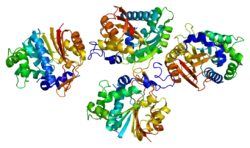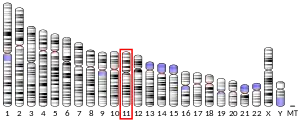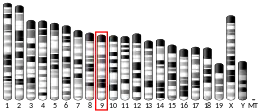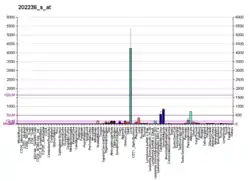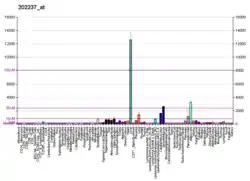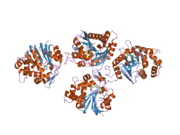NNMT
Nicotinamide N-methyltransferase (NNMT) is an enzyme that in humans is encoded by the NNMT gene.[5] NNMT catalyzes the methylation of nicotinamide and similar compounds using the methyl donor S-adenosyl methionine (SAM-e) to produce S-adenosyl-L-homocysteine (SAH) and 1-methylnicotinamide.[6]
Function
Methylation of nicotinamide by NNMT and SAM-e is the major pathway for degradation of nicotinamide leading to excretion in the urine. [6]
Clinical significance
NNMT is highly expressed in the human liver.[6][7] N-methylation is one method by which drug and other xenobiotic compounds are metabolized by the liver.[6] NNMT expression in adipose tissue is associated with obesity and insulin resistance.[6][8] Contrary to the negative effects of increased NNMT in adipose tissue, increased NNMT in liver is associated with a better metabolic profile, namely reduced serum triglycerides and free fatty acids.[8] In adipose tissue, NNMT can lead to methylation depletion, whereas because of the many methylation enzymes in the liver NNMT has a negligible effect on liver methylation.[6] But in the liver, the 1-methylnicotinamide produced by NNMT degradation of nicotinamide increases sirtuin 1 (SIRT1) by inhibiting degradation of that protein.[8] Overexpression of SIRT1 in mice has been shown to reduce insulin and fasting glucose, as well as increased metabolism and physical function.[9]
Abundant availability of nicotinamide leads to depletion of both nicotinamide adenine dinucleotide (NAD+) and SAM-e, resulting in liver steatosis and fibrosis, causing the progression from non-alcoholic fatty liver disease (NAFLD) to non-alcoholic steatohepatitis (NASH).[10]
Human embryonic stem cells expression of NNMT is believed to help maintain the cells in a naive state.[6]
NNMT expression is significantly upregulated in many cancers, including pancreatic cancer where levels of NNMT enzyme correlate with increased risk of death.[11] The cause of these correlations has not been established, but may be related to the fact that NNMT enzyme is an inhibitor of DNA repair.[11] NNMT and 1-methylnicotinamide inhibit autophagy in breast cancer, protecting breast cancer cells against oxidative stress.[12] NNMT has been suggested to be a biomarker of cancer.[11]
References
- GRCh38: Ensembl release 89: ENSG00000166741 - Ensembl, May 2017
- GRCm38: Ensembl release 89: ENSMUSG00000032271 - Ensembl, May 2017
- "Human PubMed Reference:". National Center for Biotechnology Information, U.S. National Library of Medicine.
- "Mouse PubMed Reference:". National Center for Biotechnology Information, U.S. National Library of Medicine.
- Aksoy S, Brandriff BF, Ward A, Little PF, Weinshilboum RM (Mar 1996). "Human nicotinamide N-methyltransferase gene: molecular cloning, structural characterization and chromosomal localization". Genomics. 29 (3): 555–61. doi:10.1006/geno.1995.9966. PMID 8575745.
- Pissios P (2017). "Nicotinamide N-Methyltransferase: More Than a Vitamin B3 Clearance Enzym". Trends in Endocrinology and Metabolism. 28 (5): 340–353. doi:10.1016/j.tem.2017.02.004. PMC 5446048. PMID 28291578.
- Hwang ES, Song SB (2017). "Nicotinamide is an inhibitor of SIRT1 in vitro, but can be a stimulator in cells". Cellular and Molecular Life Sciences. 74 (18): 3347–3362. doi:10.1007/s00018-017-2527-8. PMID 28417163.
- Guarino M, Dufour J (2019). "Nicotinamide and NAFLD: Is There Nothing New Under the Sun?". Metabolites. 9 (9): 180. doi:10.3390/metabo9090180. PMC 6780119. PMID 31510030.
- Bordone L, Cohen D, Robinson A, Motta MC, Guarente L (2007). "SIRT1 transgenic mice show phenotypes resembling calorie restriction". Aging Cell. 6 (6): 759–767. doi:10.1111/j.1474-9726.2007.00335.x. PMID 17877786.
- Komatsu M, Kanda T, Wakino S, Itoh H (2018). "NNMT activation can contribute to the development of fatty liver disease by modulating the NAD + metabolism". Scientific Reports. 8 (1): 8637. doi:10.1038/s41598-018-26882-8. PMC 5988709. PMID 29872122.
- Lu XM, Long H (2018). "Nicotinamide N-methyltransferase as a Potential Marker for Cancer". Neoplasma. 65 (5): 656–663. doi:10.4149/neo_2018_171024N680. PMID 29940773.
- Yu H, Zhou X, Wang Y, Zhang J (2018). "Nicotinamide N-methyltransferase inhibits autophagy induced by oxidative stress through suppressing the AMPK pathway in breast cancer cells". Cancer Cell International. 20: 191. doi:10.1186/s12935-020-01279-8. PMC 7247246. PMID 32489327.
Further reading
- Williams AC, Cartwright LS, Ramsden DB (2005). "Parkinson's disease: the first common neurological disease due to auto-intoxication?". QJM : Monthly Journal of the Association of Physicians. 98 (3): 215–26. doi:10.1093/qjmed/hci027. PMID 15728403.
- Sano A, Endo N, Takitani S (1992). "Fluorometric assay of rat tissue N-methyltransferases with nicotinamide and four isomeric methylnicotinamides". Chem. Pharm. Bull. 40 (1): 153–6. doi:10.1248/cpb.40.153. PMID 1533573.
- Aksoy S, Szumlanski CL, Weinshilboum RM (1994). "Human liver nicotinamide N-methyltransferase. cDNA cloning, expression, and biochemical characterization". J. Biol. Chem. 269 (20): 14835–40. PMID 8182091.
- Scheller T, Orgacka H, Szumlanski CL, Weinshilboum RM (1996). "Mouse liver nicotinamide N-methyltransferase pharmacogenetics: biochemical properties and variation in activity among inbred strains". Pharmacogenetics. 6 (1): 43–53. doi:10.1097/00008571-199602000-00003. PMID 8845860.
- Smith ML, Burnett D, Bennett P, et al. (1998). "A direct correlation between nicotinamide N-methyltransferase activity and protein levels in human liver cytosol". Biochim. Biophys. Acta. 1442 (2–3): 238–44. doi:10.1016/s0167-4781(98)00177-8. PMID 9804963.
- Yan L, Otterness DM, Weinshilboum RM (1999). "Human nicotinamide N-methyltransferase pharmacogenetics: gene sequence analysis and promoter characterization". Pharmacogenetics. 9 (3): 307–16. doi:10.1097/00008571-199906000-00005. PMID 10471062.
- Hubbard MJ, McHugh NJ (2001). "Human ERp29: isolation, primary structural characterisation and two-dimensional gel mapping". Electrophoresis. 21 (17): 3785–96. doi:10.1002/1522-2683(200011)21:17<3785::AID-ELPS3785>3.0.CO;2-2. PMID 11271497.
- Parsons RB, Smith ML, Williams AC, et al. (2002). "Expression of nicotinamide N-methyltransferase (E.C. 2.1.1.1) in the Parkinsonian brain". J. Neuropathol. Exp. Neurol. 61 (2): 111–24. doi:10.1093/jnen/61.2.111. PMID 11853016.
- Kassem HSh, Sangar V, Cowan R, et al. (2002). "A potential role of heat shock proteins and nicotinamide N-methyl transferase in predicting response to radiation in bladder cancer". Int. J. Cancer. 101 (5): 454–60. doi:10.1002/ijc.10631. PMID 12216074. S2CID 41683922.
- Strausberg RL, Feingold EA, Grouse LH, et al. (2003). "Generation and initial analysis of more than 15,000 full-length human and mouse cDNA sequences". Proc. Natl. Acad. Sci. U.S.A. 99 (26): 16899–903. doi:10.1073/pnas.242603899. PMC 139241. PMID 12477932.
- Xu J, Capezzone M, Xu X, Hershman JM (2005). "Activation of nicotinamide N-methyltransferase gene promoter by hepatocyte nuclear factor-1beta in human papillary thyroid cancer cells". Mol. Endocrinol. 19 (2): 527–39. doi:10.1210/me.2004-0215. PMID 15486044.
- Gerhard DS, Wagner L, Feingold EA, et al. (2004). "The Status, Quality, and Expansion of the NIH Full-Length cDNA Project: The Mammalian Gene Collection (MGC)". Genome Res. 14 (10B): 2121–7. doi:10.1101/gr.2596504. PMC 528928. PMID 15489334.
- Souto JC, Blanco-Vaca F, Soria JM, et al. (2005). "A Genomewide Exploration Suggests a New Candidate Gene at Chromosome 11q23 as the Major Determinant of Plasma Homocysteine Levels: Results from the GAIT Project". Am. J. Hum. Genet. 76 (6): 925–33. doi:10.1086/430409. PMC 1196452. PMID 15849667.
- Roessler M, Rollinger W, Palme S, et al. (2005). "Identification of nicotinamide N-methyltransferase as a novel serum tumor marker for colorectal cancer". Clin. Cancer Res. 11 (18): 6550–7. doi:10.1158/1078-0432.CCR-05-0983. PMID 16166432.
- Xu J, Hershman JM (2006). "Histone deacetylase inhibitor depsipeptide represses nicotinamide N-methyltransferase and hepatocyte nuclear factor-1beta gene expression in human papillary thyroid cancer cells". Thyroid. 16 (2): 151–60. doi:10.1089/thy.2006.16.151. PMID 16676400.
